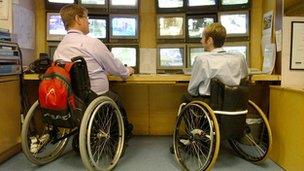MPs claim 'inflexible approach' over Remploy factories
- Published

The committee argued that the timescale for Remploy Marine bids was inflexible.
MPs have accused the UK government of taking an "inflexible approach" over the future of Remploy factories.
A report by the Scottish Affairs Committee claimed the Department for Work and Pensions (DWP) had helped only to hamper the prospects, in particular, of Remploy Marine in Fife.
It called on the UK government to instruct Remploy to extend the timescale for bids for the business.
Remploy Marine is among a number of factories which are now up for sale.
The DWP said its priority during the process was to safeguard as many jobs for disabled people as possible.
In December, the government announced plans to cut funding for Remploy following a review of disability employment support.
A total of 36 factories were sold or closed in the first phase of this process, with the remainder being put up for sale.
Bidding process
In calling for an extension to the timescale for bids for Remploy Marine, the committee said the UK government should make "more appropriate transitional arrangements available" and ensure that social enterprises, mutuals and co-operatives were able to participate in the bidding process.
It also said the government had shown no sign of taking into account the wider social context, arguing it must be included in the assessment of "the value for money" offered by the bids.
Committee member Lindsay Roy, Labour MP for Glenrothes and Central Fife, said: "Remploy was created as a means of finding employment for disabled people.
"While we understand the reasoning behind moving the factories away from public ownership its original mission should be preserved.
"The government must focus on the social value of maintaining jobs for disabled people, and must pay more attention to the wider financial and social costs of the potential closure of such sites."
The MPs also argued that the "one-size-fits-all" approach did not take account of the unique circumstances and potential of Remploy Marine Fife, which produces 30,000 lifejackets a year.
Brown intervention
Former Prime Minister Gordon Brown intervened earlier this year to try to persuade coalition ministers into a rethink on the future of two Fife factories, in Cowdenbeath and Leven.
In February he met the UK Work and Pensions Secretary to argue they had full order books and could be expanded.
The Cowdenbeath and Leven factories employ 64 disabled people and last year lost more than £1m, on a turnover of 900,000, according to the DWP.
The DWP said its priority during the sale process was to safeguard as many jobs for disabled people as possible, including offering a wage subsidy of up to £6,400 for every disabled worker.
A spokesman added: "The deadlines for the commercial process have been set to give employees and the businesses certainty about the future as soon as possible, while ensuring prospective bidders have time to develop credible proposals.
"We are following the advice of an independent review to use the specialist disability employment budget more effectively on successful schemes like Access to Work instead of losing millions of pounds in loss-making segregated factories."
- Published15 May 2013
- Published10 February 2013
- Published15 January 2013